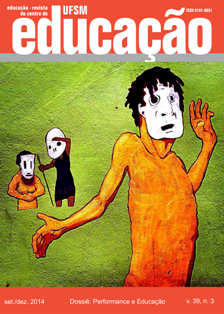Time and performance in the teaching work
DOI:
https://doi.org/10.5902/1984644414250Keywords:
Human time, performance, technology, teacher formation.Abstract
The emergence of a performative time, although it interacts with the unrestricted human dimensions to formal aspect of the formation process (Bildung), also reveals an instrumental rationality that treats the past as a means to legitimize the present technical act. The study rethink, from a philosophical point of view, the proper time of teacher training considering the performance as a precondition to the inevitable linguistic-expressive action in the world. Increasingly, the time appears as an important factor to performance, since the teaching work requires the creation attitudes, of recognition receptive values to otherness. Is necessary to think the time as inseparable from its language, according as provides new possibilities for critical aperture and renovation of educative work, giving new directions to performative act.Downloads
Published
How to Cite
Issue
Section
License
Declaration of originality
We declare that all articles present in the journal Educação (UFSM) are originals and were not submitted for publishing on any other publication, as a whole or a fraction. We also declare that, after being published by Educação (UFSM), a paper will not be submitted to another journal within two years. After this time, our journal transfers the publishing rights to the authors, with a permit granted by the Editorial Council.
We also acknowledge that the originals’ submission to Educação (UFSM) implies on a transference of copyright for physical and digital publishing to the journal. In case of noncompliance, the violator will receive sanctions and penalties predicted by the Brazilian Copyright Protection Law (n. 9610, dated 19/02/98).
Attribution 4.0 International (CC BY 4.0)
This license lets others remix, transform, and build upon the material for any purpose, even commercially, and copy and redistribute the material in any medium or format.

This work is licensed under a Creative Commons Attribution 4.0 International (CC BY 4.0)






